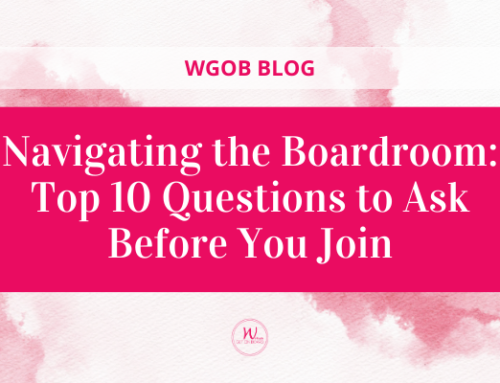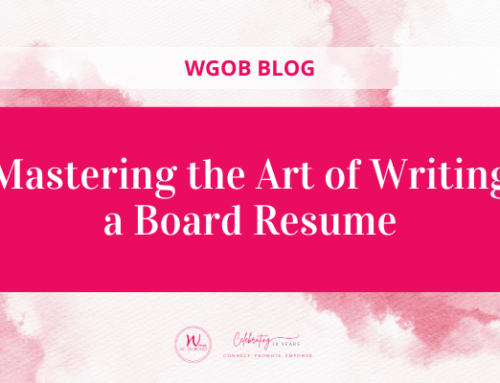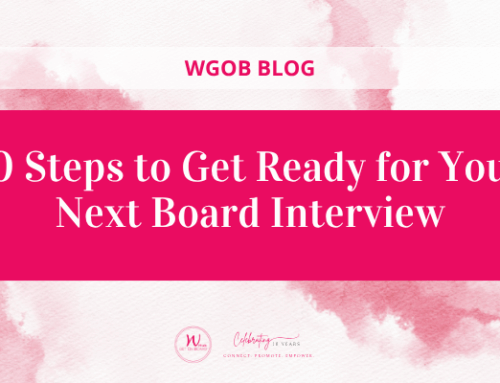Women Get On Board event presented by The Directors College on November 9, 2016
Many will agree that a board of directors is much more than the sum of its parts. One of the most impactful factors in overall board effectiveness is ensuring that skills, expertise and personal attributes of individuals on the board meet the needs identified in the board skills matrix. Dr. Michael Hartmann, Principal of The Directors College, noted this as he moderated an insightful conversation with our panel of governance professionals consisting of Lynn Beauregard and Anna Paluzzi, C.Dir.
The panel explored how to be an effective director through the value of continued governance education, how to apply the lessons learned through formal education to real board experience and ultimately, how to evolve into an impactful and effective member of the board.
Value of taking formal board education:
“I can’t put a price on the networking and the relationships that extend beyond the course.”
~ Anna Paluzzi, C.Dir – 2015 graduate of The Directors College
- Foundational information covering everything board related.
- Personal growth through conversations with peers with varied values, opinions, and ideas. As a board member, one requires the consideration and patience to ‘group think’.
- Expansion of professional network through dialogue and learning from one another.
- Everything learned and experienced through formal governance education is applicable to directors. You refer to the foundational information to help with the structure and processes of the board to be more impactful.
Drivers behind individuals taking formal education, Dr. Michael Hartmann, Principal of The Directors College:
- Knowledge: overall knowledge and thorough understanding of board responsibilities and dynamics provides confidence and certainty.
- Behaviour: by taking formal governance courses, students found it was a time of self-reflection, diversity of thought, and openness to altering pre-conceived views.
- Best governance practices and formal accreditation.
“Accreditations show that you have the knowledge and understanding of the fundamentals and also embeds you in a valuable network. As a director, you need to think about where the gap is that you can help to close? Where do you have gaps that need to be developed? That may be quite focused versus formal education, that’s more holistic.”
~ Dr. Michael Hartmann
What current or emerging topics do boards need to be better educated on?
“Management needs to give enough information regarding its challenges in a manner that’s understandable by all (no acronyms!). This is because board members are expected to make decision based on that information. That said, board needs to also ask questions.”
~ Anna Paluzzi, C.Dir.
Orientation:
- Interactive moments that create a dialog between the directors.
- Individual training to facilitate a conversation regarding organizational risks.
Risk management:
- What are you going to do to manage risk? What if the unexpected happens? As a board member you need to be prepared and trained to take on challenges.
Technology:
- Understand and identify the gaps the organization has.
- It’s about the context first, and the necessary technology second. What is the value the technology brings to the organization? How will technology help the organization fill the gaps?
Engagement:
- Learn from the ground up what the organization is about, the decision you need to make and the challenges you need to solve. Engage with the organization’s community and stakeholders to understand the value of your decisions.
Key areas of focus:
- Ensure inclusivity, appropriate orientation and fact finding for existing and new board members.
- Identify gaps and information the board does not have.
- Consider the unexpected and look to other industries and disruptions that occurred.
- Learn from the ground up to understand the decisions the board needs to make, the challenges it needs to solve and the impact of such decisions on the community and the stakeholders.
What behaviours do board members exemplify to solve complex situations? How did you develop your own knowledge and skills as a director?
“You’re only as good as the information, education and the support that you receive from the board members and senior leadership. Step outside of ‘group-think’ because diversity of opinion adds significant value to the board.”
~ Lynn Beauregard, President, Governance Professionals of Canada (GPC)
Key takeaways:
- No egos or authoritarian approach to leading.
- Step outside of personal viewpoints and be open to changing your perspective.
- Ask questions that challenge.
What do formal board educators need to focus on?
“Status quo doesn’t work. The face of the boards is changing and educators need to refresh and bring the most up to date information [to it’s members and students].”
~ Lynn Beauregard, President, Governance Professionals of Canada (GPC)
Key topics of focus:
- Innovation and diversity.
- Digital technology and digital disruption.
- Cyber risk.
“How to manage change and how to be innovative. What trends are impacting TSX listed companies and how are other industries changing?”
~ Anna Paluzzi, C.Dir.
What would you say to an aspiring director regarding taking formal governance education certification program?
“The best way to get on a board, is to get on a board!”
~ Lynn Beauregard, President, Governance Professionals of Canada (GPC)
Find organizations that are hungry for your expertise. Join a board of a smaller organization to get the confidence and experience, and then consider formal education.
Key takeaways:
- Get on a board first.
- Consider your aspirations.
- Consider getting formal board accreditation once you’ve experienced being a board member.
- Formal governance education is a big time commitment.
- Sign up to Boardmatch to find opportunities.
“What are your aspirations, where are you going with this, do you have the time to do this? Education should depend on what your aspirations are. But, I would highly recommend it. There is no downside. It help me become a much more effective director and share that information with the board.”
~ Anna Paluzzi, C.Dir.
What’s the difference between being an effective board member and being an effective senior executive?
“Nose in, fingers out but not mouth shut.”
~ Lynn Beauregard, President, Governance Professionals of Canada (GPC)
The hats are very different between the board and management. As a board member, you’re there to provide guidance. You’re the visionary. You’re helping with the decisions, approving the direction but aren’t making those decision, that’s the job of senior leadership. A board should be more strategic in the thought process as opposed to operational.
If you’d interested about learning how to enhance your board experience and skills, read our “Top 3 Tips for Building a Board Profile”.
Conclusion:
Given a board’s critical role in being effective, it is important that each director ensures they devote time to ongoing education.
‘How to be an effective director’ derived from the Women Get On Board event held on November 9, 2016 was conceptualized, written and formatted by Nat Korol, partner at Hyphen Co., that partners with organizations to help navigate and implement the right marketing and design solutions to realize your business objectives.






